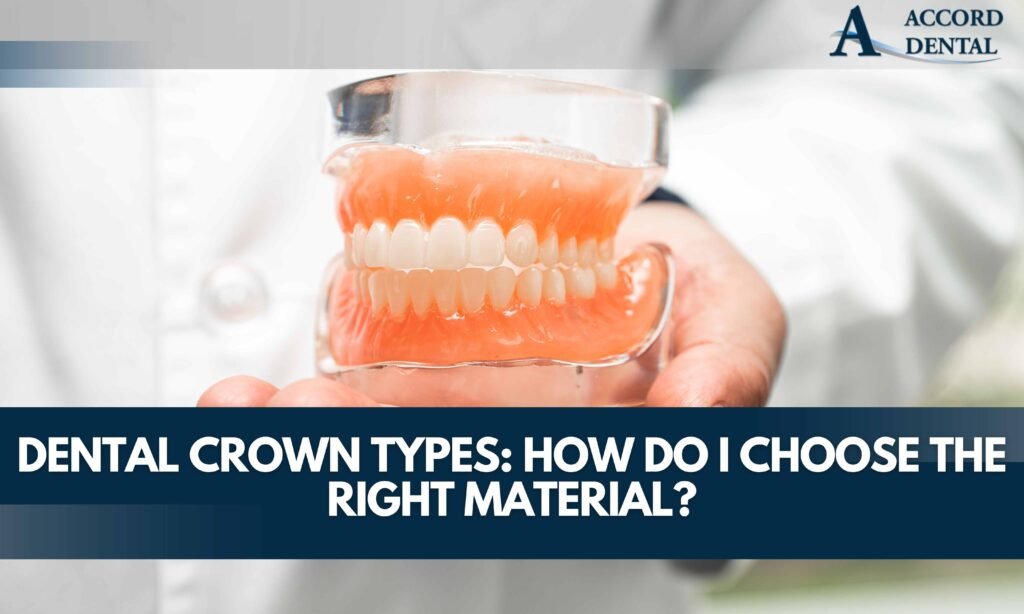When faced with a damaged or decayed tooth, dental crowns are often the most effective solution for restoration. Dental crowns serve as protective caps that fit over the tooth, restoring its shape, strength, and function. However, with a wide range of crown materials available today, it can be challenging to know which is best suited for your specific needs. The choice of material impacts everything from the crown’s appearance to its durability, cost, and how long it will last. If you’re considering getting a Dental crown in Grafton, MA, We will help you understand the different types of materials used in dental crowns, their benefits and drawbacks, and how to choose the most appropriate option for you. By the end of this article, you’ll know exactly how to make an informed decision when selecting your crown.
What is a Dental Crown?
A dental crown is a cap that completely covers a damaged or decayed tooth. It’s typically made of durable materials that restore the tooth’s original shape and function. Crowns are used to:
- Strengthen weak or damaged teeth
- Protect a tooth after a root canal
- Restore the shape of a fractured tooth
- Improve the appearance of a discolored or misshapen tooth
- Cover a dental implant
Crowns are custom-made to fit your tooth precisely and can be made from various materials, each with different properties. Your dentist will work with you to help choose the best material based on your needs, preferences, and budget.
Types of Dental Crown Materials
The material of your dental crown determines its strength, aesthetic appeal, cost, and how long it will last. Let’s take a closer look at the most popular types of dental crowns and what they offer.
1. Porcelain Crowns
Porcelain crowns are highly aesthetic and offer a natural look. This material closely mimics the color and translucency of natural teeth, making it an excellent choice for visible teeth, such as the front teeth. Porcelain crowns are often chosen for their ability to blend seamlessly with your smile.
Pros:
- Highly aesthetic: Matches the color and texture of natural teeth.
- Stain-resistant: Porcelain crowns are resistant to staining and discoloration, keeping your smile bright and fresh.
- Biocompatible: Since porcelain is non-metallic, it is an excellent option for people with metal allergies.
Cons:
- Less durable: While porcelain is strong, it’s more prone to chipping or cracking than metal-based crowns.
- Not ideal for molars: Due to the amount of chewing pressure on back teeth, porcelain may not be the best choice for molars.
Porcelain crowns are often the preferred choice for individuals seeking a natural, seamless appearance for front teeth or visible restorations.
2. Metal Crowns
Metal crowns are made from alloys like gold, platinum, and palladium. These crowns are renowned for their strength and durability, making them ideal for areas of the mouth that experience heavy biting and chewing forces. Metal crowns are more commonly used on the back teeth, where the appearance of the crown is less noticeable.
Pros:
- Extremely durable: Metal crowns are among the longest-lasting, and they can withstand the stress from biting and chewing.
- Wear-resistant: Metal crowns don’t wear down over time like porcelain or composite crowns.
- Less wear on surrounding teeth: Metal crowns are smoother and less abrasive than porcelain, so they won’t wear down adjacent teeth.
Cons:
- Aesthetics: Metal crowns are not the best choice for visible teeth due to their color. The shiny gold or grayish appearance can stand out.
- Allergies: Some people may have allergic reactions to certain metals, although this is rare with modern alloys.
Metal crowns are best for molars or other less visible areas in your mouth.
3. Porcelain-Fused-to-Metal Crowns (PFM)
Porcelain-fused-to-metal (PFM) crowns combine the strength of a metal base with the aesthetic appeal of porcelain. These crowns are versatile and are commonly used for both front and back teeth. The porcelain outer layer gives the crown a natural look, while the metal core ensures durability.
Pros:
- Durable: The metal base provides strength and long-lasting protection for your tooth.
- Natural-looking: The porcelain surface offers an aesthetic appearance, making the crown blend with surrounding teeth.
- Versatile: Can be used for both front and back teeth.
Cons:
- Visible metal line: Over time, the metal base may become visible at the gum line, especially if the gums recede, which can affect the aesthetics.
- Abrasion: The porcelain surface can be abrasive, leading to wear on the opposing teeth.
PFM crowns offer a great balance between durability and appearance, making them a solid choice for many patients.
4. Zirconia Crowns
Zirconia crowns are made from zirconium dioxide, a highly durable and natural-looking ceramic material. These crowns are highly resistant to fracture and offer excellent strength while still providing a good aesthetic appearance.
Pros:
- Highly durable: Zirconia crowns are among the strongest available and are ideal for teeth that experience heavy chewing pressure.
- Natural appearance: Zirconia has a translucent quality that makes it look similar to natural teeth, making it a good choice for both front and back teeth.
- Biocompatible: Zirconia is non-reactive, which makes it safe for individuals with metal allergies.
Cons:
- Harder than porcelain: While this is a strength in terms of durability, it can be a disadvantage as it may wear down opposing teeth more quickly.
- Less translucent: While it looks natural, zirconia is not as translucent as porcelain, which may be noticeable on front teeth.
Zirconia crowns are a great option for anyone needing a durable and natural-looking crown.
5. Resin Crowns
Resin crowns are made from composite materials and are generally used as a more affordable option for those who need a temporary crown or are on a budget. Resin crowns are typically not as durable as other materials and are more prone to chipping or staining over time.
Pros:
- Affordable: Resin crowns are often the least expensive material option.
- Quick and easy placement: Resin crowns can be placed more quickly than other types.
Cons:
- Less durable: Resin crowns are not as long-lasting as porcelain, zirconia, or metal crowns.
- Staining: Over time, resin crowns can become stained and lose their aesthetic appeal.
Resin crowns are usually used for temporary crowns or for patients on a tight budget.
6. Stainless Steel Crowns
Stainless steel crowns are used primarily for children’s teeth or as temporary crowns for adults. They are strong, durable, and affordable but not very aesthetic.
Pros:
- Durable: Stainless steel is very strong and offers excellent protection for the tooth.
- Affordable: These crowns are typically one of the cheapest options.
Cons:
- Aesthetics: Stainless steel crowns are silver in color, which makes them very noticeable.
- Temporary use: These crowns are often used as temporary solutions.
Stainless steel crowns are ideal for pediatric dentistry or as temporary crowns for adults until a permanent solution is in place.
How to Choose the Right Dental Crown Material
Choosing the right crown material depends on several factors including your aesthetic preferences, durability needs, and budget. Let’s break down these key considerations.
Location of the Tooth
The location of the tooth to be crowned plays a crucial role in material selection. If the crown is for a front tooth that is visible when you speak or smile, you’ll likely prefer a more aesthetic option such as porcelain or zirconia. For back teeth (molars) that are less visible, a metal crown may be a more practical option due to its durability.
Durability and Strength
If you need a crown that can withstand heavy chewing forces, consider metal or zirconia crowns. These materials are highly durable and can endure the stress from biting and chewing. Porcelain crowns, while natural-looking, may not be the best choice for molars or teeth that experience significant pressure.
Aesthetic Preferences
If you want a crown that blends seamlessly with your natural teeth, porcelain, zirconia, and PFM crowns are the best options. These materials can be color-matched to your natural teeth, ensuring that the crown looks as realistic as possible.
Budget
Your budget will also influence your decision. Porcelain crowns tend to be the most expensive, while resin and stainless steel crowns are more affordable options. However, choosing a less expensive material may result in a shorter lifespan or reduced durability, so it’s important to balance cost with long-term benefits.
Allergies or Sensitivities
If you have metal allergies or sensitivities, you may want to opt for porcelain, zirconia, or resin crowns, which are free of metal. These materials are highly biocompatible and less likely to cause irritation or allergic reactions.
Conclusion
Selecting the right material for your dental crown is a crucial decision that impacts both the functionality and aesthetics of your smile. Whether you’re in need of a Dental crown in Grafton or considering a crown in Grafton, make sure to consult with an experienced dentist who can guide you through the process. If you’re looking for a Dentist in Grafton, MA, a skilled professional will help you choose the best material for your unique needs. With a range of options to suit different preferences and budgets, you can restore your smile with a crown that looks great and lasts for years.






